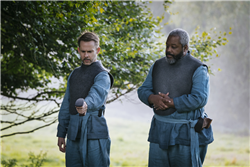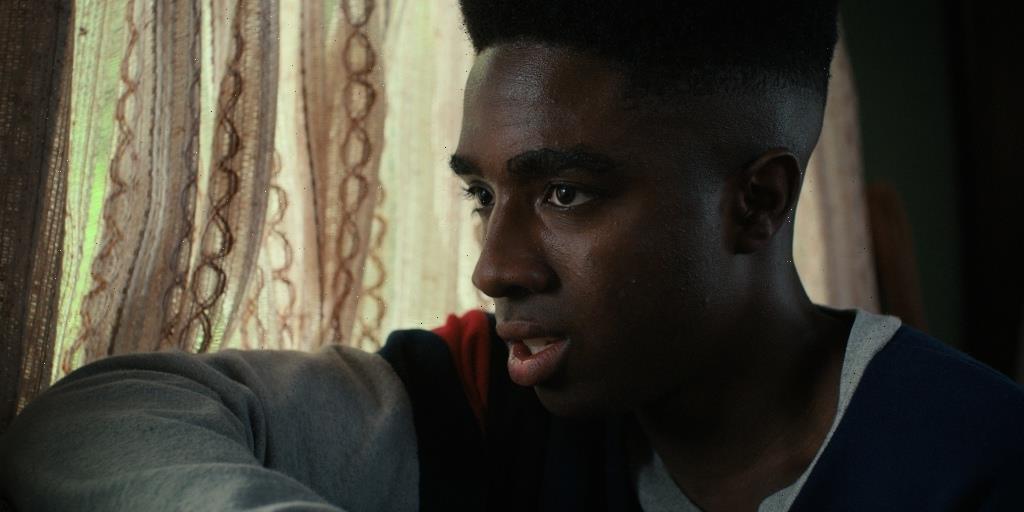Science fiction (and speculative fiction, its bespectacled cousin) have always been uniquely fertile ground for political allegory. And sci-fi’s metaphorical potential only grows stronger when the politics and culture of real-life society start to resemble the surreality of a dark parallel universe or an alternate history.
That frisson of topicality is what made Hulu’s “The Handmaid’s Tale” a critical and commercial success in its early seasons. “Handmaid’s” acclaim and viewership have anecdotally ticked down in subsequent seasons, but when the U.S. Supreme Court voted to nullify a half-century of reproductive freedom, dozens of women showed up to protest in “Handmaid’s” sadly iconic red-robe-and-white-blinder ensemble. It’s proof in essence that Margaret Atwood’s narrative, as vividly rendered in creator Bruce Miller’s imagery, has become more popular as political ideology than they ever were as stories.
Into that tangled fray comes AMC+’s “Moonhaven,” a sci-fi drama that foregrounds its knotty ideas about humanity as aggressively as anything Gene Roddenberry or Rod Serling ever conceived. Specifically, “Moonhaven” explores the question of whether the fundamental nature of the human condition is precisely what renders humanity itself unsustainable. The show takes place a century hence, when the Earth has been laid low by overpopulation, dwindling resources, a toxified environment, and of course, the bloody wars that would inevitably result from such circumstances.
Humanity’s only hope lies on Moonhaven, a verdant, 500-square-mile commune constructed on the moon and populated with space pilgrims entrusted to solve the problems facing Earth — and one day to import those solutions back home. It’s a quixotic goal, but 30 years into the experiment, the Mooners (their official demonym) are honestly killing it. With the guidance of a presumably post-singularity artificial intelligence called IO, Moonhaven has figured out how to make turbid water potable, create a healthy and sustainable food source, and snuff tribal conflicts before they even begin. (They can’t be far off from developing vegan mozzarella that could fool an Earth fromagier.)
As the series begins, the Mooners are equally enthusiastic and terrified about “The Bridge,” the long-awaited phased migration back to Earth, and Moonhaven’s reason for existing. It’s the worst possible time for Moonhaven’s first murder, but that’s the unfortunate task given to Paul Sarno (Dominic Monaghan) and his partner Arlo (Kadeem Hardison), the equivalent of detectives in a society that shouldn’t require them.
While they’re working to solve the murder, Indira Mare (Amara Karan), Earth’s envoy to Moonhaven, is traveling to the colony alongside her bodyguard Tomm (Joe Manganiello). Manning the controls of Indira’s space shuttle is Bella Sway (Emma McDonald), a world-weary future-war veteran with skeptical views about the promise of Moonhaven. Bella’s mission is meant to be a quick hop across space and back, but she’s quickly sucked into the murder investigation and the political intrigue swirling around The Bridge.
Creator Peter Ocko, who previously helped developed the gone-too-soon “Lodge 49,” has once again built a show with a deep and potentially intimidating mythology. The first half of the pilot borders on alienating, which is not uncommon for the genre, but “Moonhaven” piles on the mumbo-jumbo early and often. Mooner culture is not unlike that of a hippie commune with a barely concealed dark side. They have their own goofy way of speaking, full of arbitrary abbreviations and invented compound words, which makes the impassioned monologues more funny than stirring. Everyone on Moonhaven wears colorful burlap loungewear and communicates their emotions through modern dance. They’re also terribly smug, as if they solved humanity’s problems just for the bragging rights.
Bella acts as an audience proxy, overwhelmed by all the cultural differences and resistant to join a community that sees her as a helpless, unenlightened Earther. It’s hard to blame her given how closely Moonhaven resembles a terrestrial doomsday cult. For all of IO’s advanced intelligence, apparently it hasn’t learned anything about folk horror or sex cult docuseries, otherwise it wouldn’t have made utopia so hard to distinguish from “Midsommar” or “Wild Wild Country.”
Though “Moonhaven” initially feels constrained by the sheer amount of information it has to relate, by the end of the pilot, the show has sunk its hooks in. Despite the genre formalism and the heaviness of the ideas, “Moonhaven” never feels trapped under its own weight. It’s a surprisingly fun show with a tight, brisk narrative that lends each of the six episodes an electrifying cliffhanger. It delights in introducing IO’s technology and trotting it out in cool, satisfying ways. The dialogue may be overstuffed with nonsense, but the plot and visuals certainly aren’t.
Monaghan gets top billing on “Moonhaven,” but the show belongs to McDonald, whose ability to communicate the well of sorrow behind Bella’s tough exterior rivals performances from Juliette Lewis and Michelle Rodriguez. That’s not to take anything away from Monaghan, whose scenes with Hardison create the buddy-cops-in-space dynamic the world never knew it needed. The casting of Hardison and Monaghan, both known for playing characters whose most lethal weapons are their quips, speaks to how “Moonhaven” prioritizes levity as the story grows darker.
And boy, is there a dark side of the Moonhaven. It should come as no surprise that the community’s first murder is far from its last, and the dread compounds as various factions reveal themselves. Do the Mooners actually intend on sharing their resources and advanced technology with the Earth, or are they determined to hoard their wealth as countless others suffer? Is the family structure the foundation of society, or merely the kindling for sectarian violence? When does a freedom fighter become a terrorist, and who gets to decide? “Moonhaven” plays with all these ideas, so as strong as it is as a sci-fi romp, its true potential might come years from now when its premise begins to look more like science than fiction.
The first two episodes of “Moonhaven” premiere on AMC+ on July 7, and then they drop weekly.
Source: Read Full Article


